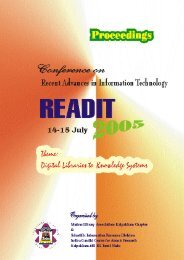READIT-2007 - Indira Gandhi Centre for Atomic Research
READIT-2007 - Indira Gandhi Centre for Atomic Research
READIT-2007 - Indira Gandhi Centre for Atomic Research
You also want an ePaper? Increase the reach of your titles
YUMPU automatically turns print PDFs into web optimized ePapers that Google loves.
high quality in<strong>for</strong>mation and by networking people and their ideas together using the<br />
technological infrastructure. The emphasis will shift from technical skills in the library to<br />
communication, facilitation, training and management skills (e.g. strategic and marketing<br />
management).<br />
4. THE LIBRARIANS OF FUTURE<br />
The trans<strong>for</strong>mation from librarian to knowledge manager is clearly underway;<br />
however, a deeper look at the direction that the Internet is taking research reveals the<br />
possibility of more far-reaching changes. As many business processes move to the<br />
Internet, the use of in<strong>for</strong>mation will become integrated with the systems and services. In<br />
this environment, in<strong>for</strong>mation as a distinct function or resource may no longer exist. To<br />
adjust to these more far-reaching changes, in<strong>for</strong>mation professionals must search beyond<br />
current bounds (e.g. librarian, in<strong>for</strong>mation, knowledge management) and think in terms<br />
of benefits to their organizations. Right now, in<strong>for</strong>mation can be used to enhance<br />
competitiveness and productivity. If in<strong>for</strong>mation is to be seamlessly integrated with<br />
transaction processes, then someone must scope out work-related behaviors to ensure that<br />
it is done in the most efficient and effective manner. And, if equal in<strong>for</strong>mation and<br />
technology is available to everyone, then competition rests on the ability to interpret and<br />
apply these tools. Clearly the impending shift to knowledge management (and beyond)<br />
represents an exciting change <strong>for</strong> library and in<strong>for</strong>mation professionals. However, it's an<br />
opportunity that requires a great deal of preparation, and a new way of thinking.<br />
5. CONCLUSION<br />
Thus, the role of the librarian is evolving to network specialist, in<strong>for</strong>mation<br />
broker, systems designer and knowledge manager to mention only a few directions. In<br />
essence, an overall intensification of specialization both in the technological aspects of<br />
library and in<strong>for</strong>mation services, as well as stronger subject-oriented competencies and<br />
evaluative abilities are being demanded from the in<strong>for</strong>mation professionals and should be<br />
taken into consideration both in the training and education of professionals as well as in<br />
in-service continuing education to meet the changing technological demands at the<br />
organization.<br />
REFERENCES<br />
1. Wendy Jordan and Victoria Ward. The Role of the Librarian in a Knowledge Society,<br />
The proceedings of a lecture/workshop at Sultan Qaboos University, 19 February 2001.<br />
2. Diann Rusch-Feja, New Roles <strong>for</strong> Librarians in Supporting <strong>Research</strong>ers in the Social<br />
Sciences: The Impact of New Technology, 62nd IFLA General Conference - Conference<br />
Proceedings - August 25-31, 1996.<br />
3. Olivia Crosby. Librarians: In<strong>for</strong>mation experts in the in<strong>for</strong>mation age. Occupational<br />
Outlook Quarterly, 2000-01.<br />
4. Beyond ‘Library 2.0 and “Library 2.0”’ URL: <br />
12

















